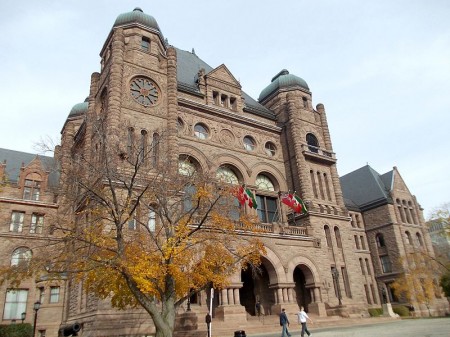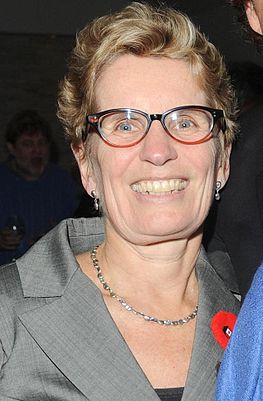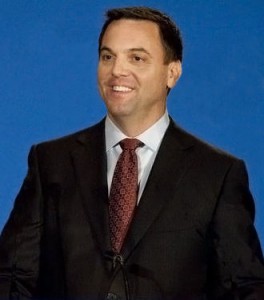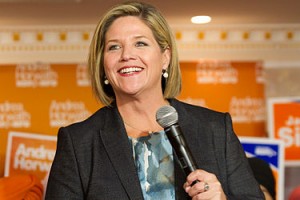Ontario election off to a lackluster start

The Legislative Assembly of Ontario, in Toronto. Photo: Andrijko Z., via Wikimedia Commons
In case you missed the news, Ontario is in the midst of a late spring election.
Here’s the setup. The incumbent premier, Kathleen Wynne, headed a Liberal minority government. As the name implies, minority governments don’t have enough votes to pass measures without support from at least one other party. In the parliamentary system a government will “fall” (head back to the polls) if it loses a confidence measure. Budgets are always confidence measures – they have to pass, or a new election is triggered.
So, when the New Democratic Party’s Leader, Andrea Horwath, announced the NDP would not support the Liberal’s proposed budget, Wynne bowed to the inevitable. In early May she asked for, and was granted, a provincial election – set for June 12th. Now her party will face the NDP and the Progressive Conservative Party of Ontario (the Conservatives).

The incumbent: Liberal Kathleen Wynne. Photo: Canadian Film Centre, via Wikimedia Commons
The remaining main player in what amounts to a three-party race is Tim Hudak, leader of the Conservatives. He heads the official opposition party, which holds the second largest number of legislative seats. While polling suggests the race is between the Liberals and the Conservatives, the NDP is a key factor too, especially if the other parties fail to win a majority.
Does anyone care? Elections do matter, especially to the politicians. But to the public at large, maybe not so much. Not thus far, at least.
Here I’ll add a few random side notes: Wynne is pronounced “Win”. She didn’t arrive at Ontario’s top spot through a general election, she replaced three-time Premier Dalton McGuinty in a party election, after he stepped down ahead of political and potential legal difficulties. Wynne has launched a $2 million lawsuit against Hudack, the Conservative Party and Conservative MPP Lisa MacLeod over statements they made alleging that Wynne “oversaw and possibly ordered the criminal destruction of documents to cover up the gas plants scandal.” Wynne is also Canada’s first openly gay premier, which appears to have no particular impact on her reelection bid. At one point last year, Canada had a record number of females leading at the provincial level: six. That has since fallen to the current tally of two.

Wynne’s main challenger Conservative Opposition Leader Tim Hudak. Photo: Tim Hudak/Andrew C., via Wikimedia Commons
Getting back to the current campaign, there are a number of issues Ontario voters could get excited about, including the so-called gas plant scandal and a lackluster economy in the province typically considered the engine of the nation.
Some say the election is, or ought to be, about the record of the Liberal Party’s recent governments, as outlined in a commentary by Kelly McParland in the National Post:
Who’s going to remember? Dalton McGuinty promised no new taxes in 2003, then immediately raised taxes and was re-elected twice. Mr. McGuinty’s long list of broken promises, in fact, were once a big issue with critics of the Liberals, until their many scandals came along and pushed the broken pledges down the complaint list. In today’s news cycle, issues last just long enough to be denounced on Twitter before everyone moves on to something else. Mr. McGuinty has only been out of office a year or so, and Kathleen Wynne, his successor, already insists nothing he did during 10 years in office has any relevance to her.
That excerpt touches on widespread voter apathy, which many consider a serious problem here. How and why Canadians have reached this state of alienation from political theatrics is discussed in this HuffPost Canada essay by Glenn Pearson (a former MP):
Though not a universal sentiment, disillusionment in modern politics is likely the lowest it has ever been.
And don’t count NDP Leader Andrea Horwath out – her party is in the race too. Photo: Ontario NDP, Creative Commons, some rights reserved
It’s not hard to comprehend why the democratic spirit is so low. There have been enough scandals at various levels of government that average Canadians can be forgiven for wondering what has become of the political order. It’s increasingly apparent that the old partisan wars no longer create the kind of political energies that they used to. One tweet from a citizen from my home city of London pretty well summed it up: “Hey, if you’re going to keep partisan bashing the other parties, don’t count on my vote.” Then there’s the negative advertising that consistently drives down voter turnout. Or as the Toronto Star put it this week, “Negative ads destroys voter trust in all politicians.” Rounding it all out is the repeated claim that it doesn’t matter who gets elected, our problems never seem to get solved.
The Toronto Star has this chart of the three main parties positions on key issues, including: jobs/economy, transit, labour, social assistance, health care, education, pensions, taxes and energy.
Of course Quebec’s recent election turned into one that mattered quite a bit to Quebec voters – and Canadians at large.
Here in Ontario, it remains to be seen if anything catches fire in a cynical, politics-as-usual scene between now and June 12. For interested readers, ongoing election coverage can be found at many news organizations, including this summary site from CBC.
I write this a someone who spent her first 40 years as a U.S. citizen in America, meaning some aspects of parliamentary systems feel strange. Voting in Canada, I will never cast an actual ballot for prime minister, or provincial premier – unless I happen to live in that candidate’s riding (district). And even then, I’d only be electing that person as an MP or MPP.
Indeed, my very short federal ballot only contains candidates to become MPs (members of parliament) from my riding. (Senators in Canada are appointed, not elected. But that’s another story!) My provincial ballot will only have local contenders for MPP (members of provincial parliament). Which always feels like a lot is missing.
Having said that, few Americans can explain their own oddities, like the Electoral College. Each system has different strengths, customs and quirks.
If there’s some aspect of the current Ontario election I’ve neglected, or explained poorly, please weigh in and add that to the conversation.
Tags: canada, economy, Ontario, Ontario election 2014, politics









The recent Liberal government budget offered the NDP an awful lot of what they wanted to see funded. They refused to support it thereby triggering this election. The NDP will never get elected themselves but they now run the risk of getting the very right-wing conservative party in power – a party which will give the NDP nothing of what they wanted and will indeed take away plenty. Where is the logic in that, NDP?
It is true that the recent scandals of the Liberal party are reprehensible. But they were the product of the previous premier of Ontario and his cadre. The new Liberal premier, everyone agrees, had nothing to do with those scandals. So, hold the old premier and his people to account (including prison time, if laws were broken) but don’t take it out on the current premier and run the risk of getting the Conservatives elected. Where is the logic in that, NDP?
I think the leader of the NDP is out of her depth.
“Wynne is also Canada’s first openly gay premier, which appears to have no particular impact on her reelection bid.”
Maybe Canadians are a little more evolved than we are. They judge leaders by how competent they are at their job rather than by the gender of whom they share a bed with when they go to sleep.
Hawk: That’s not quite how parliamentary politics works. The previous premier did not operate in a vacuum. He did so with the support of his party. It wasn’t Dalton McGuinty emperor. It was Dalton McGuinty head of a Liberal government put there by Liberal MLAs. It’s the Liberal government as a whole, not just Kathleen Wynne, who’s asking for re-election. Thus it’s the Liberal government as a whole who’s going to be judged for better or worse.